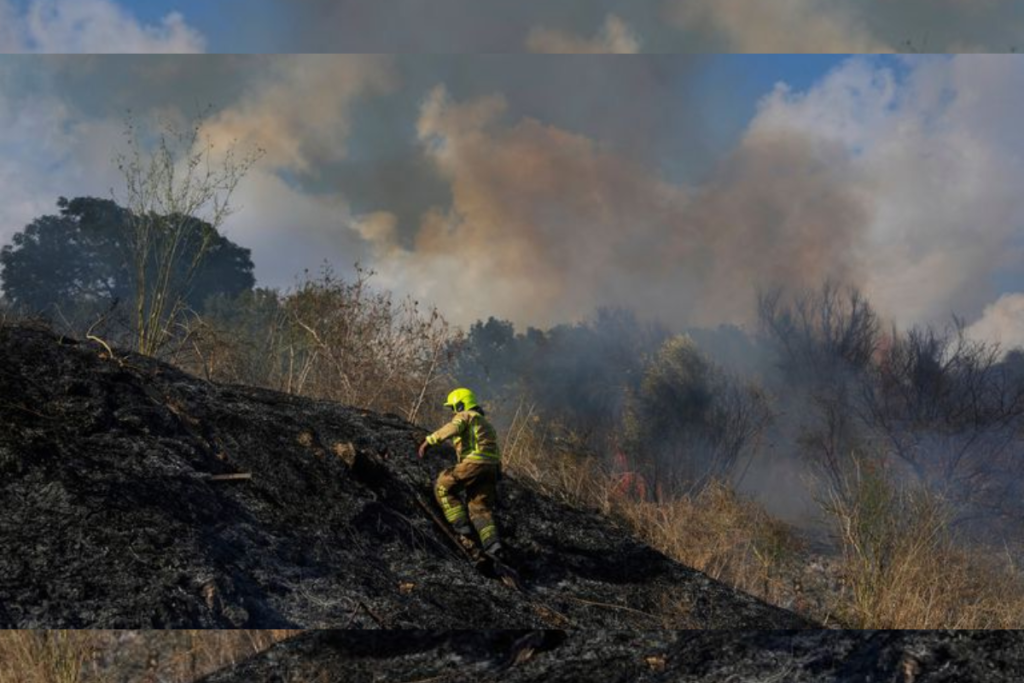
On September 15, 2024, a missile launched from Yemen by the Iran-backed Houthi rebels landed in central Israel, marking a significant escalation in the already tense Middle Eastern conflict. This attack, which triggered air raid sirens across central Israel, is the latest in a series of missile strikes aimed at Israel from the Houthis, who have vowed to increase their assaults in response to the ongoing war between Israel and Hamas. As the conflict widens, this development underscores the regional implications of the Gaza war and raises concerns about the broader involvement of Iran-aligned groups.
Missile Launch and Impact
The missile, which fell in an open area in central Israel, did not cause significant casualties or damage, but it sparked panic as air raid sirens blared at Ben Gurion International Airport. The Israeli military activated its air defense systems, attempting to intercept the missile mid-flight. Footage from Israeli media showed civilians scrambling to shelters and evidence of fragments from the missile in public spaces, including a train station in Modiin (POLITICO) (The Times of Israel).
This latest missile attack follows a pattern of escalating Houthi aggression towards Israel, with drones and missiles frequently being launched from Yemen since the outbreak of the war in Gaza. Although most of these projectiles have been intercepted before reaching Israeli territory, a few have caused damage, with a notable Iranian-made drone attack in July 2024 killing one person in Tel Aviv (POLITICO).
Houthi Threats and Regional Dynamics
The Houthis have declared their support for Hamas and other Palestinian groups, aligning themselves with Iran’s broader regional strategy of challenging Israeli influence. In a statement following the missile strike, a Houthi spokesperson warned that “Israelis will have to be in shelters” as Yemenis celebrate religious events, a bold claim that reflects the rebels’ determination to escalate the conflict further (The Times of Israel).
This latest missile strike is part of a larger pattern of regional destabilization, where Iran-backed groups, including Hezbollah in Lebanon, have increased their military activities. Hezbollah, which has also engaged in daily exchanges of fire with Israeli forces along the Lebanon-Israel border, has issued similar warnings, hinting at a broader conflict that could engulf the entire region (POLITICO).
Israel’s Response
In response to the attack, Israeli Prime Minister Benjamin Netanyahu hinted at possible military retaliation, referencing previous strikes on Houthi-controlled areas in Yemen, including the strategic port city of Hodeidah. Israel has conducted several airstrikes on Yemeni territory in recent months in retaliation for Houthi attacks, and Netanyahu’s recent remarks suggest that such operations could intensify following this latest missile strike (POLITICO).
Israel’s military has emphasized its preparedness for further attacks from Yemen, and the interception of the missile highlights the country’s reliance on its advanced air defense systems. However, the ongoing barrage of projectiles from multiple fronts—Lebanon, Gaza, and now Yemen—places significant pressure on Israel’s defense capabilities and raises questions about the long-term sustainability of its military operations (The Times of Israel).
Iran’s Role and Broader Regional Implications
Iran’s involvement in the conflict is becoming increasingly evident as its proxies across the Middle East escalate their attacks on Israel. Tehran has provided advanced weaponry, including missiles and drones, to the Houthis, Hezbollah, and Hamas, enabling these groups to strike deeper into Israeli territory. Iran’s support for the Houthis has emboldened the rebels, who have expanded their missile capabilities and demonstrated a willingness to target Israeli civilians and military assets (The Times of Israel).
The ongoing war in Gaza, sparked by Hamas’ attack on southern Israel in October 2023, has drawn in various regional actors. Iran’s strategy appears to be aimed at stretching Israel’s military resources thin by opening multiple fronts, from Gaza to Lebanon and now Yemen. This multi-front conflict risks drawing in other regional powers, including Saudi Arabia and the United Arab Emirates, both of which have vested interests in containing Houthi aggression and maintaining stability in the Arabian Peninsula (POLITICO).
International Reactions
The international community has expressed growing concern over the escalating violence in the Middle East. Western countries, including the United States, have reaffirmed their support for Israel’s right to defend itself while urging restraint to avoid further civilian casualties. At the same time, humanitarian organizations have warned of the devastating impact of the conflict on civilians in Gaza, Lebanon, and Yemen (The Times of Israel).
International carriers have also responded to the rising security risks by canceling flights into and out of Israel during periods of heightened tension. The economic toll of the war is being felt across the region, with disruptions to shipping in the Red Sea and the potential for further instability affecting global trade (POLITICO).
Final Verdict
As the conflict between Israel and Hamas continues to ripple across the Middle East, the involvement of the Houthis in Yemen adds another layer of complexity to an already volatile situation. The missile attack on central Israel underscores the growing regional dimensions of the conflict, with Iran-aligned groups like the Houthis playing a pivotal role in escalating hostilities. As Israel prepares to respond, the potential for a broader, more destructive regional war looms large, with the international community closely watching for any signs of further escalation.
The Houthis’ continued missile strikes, along with Hezbollah’s ongoing clashes with Israeli forces along the northern border, point to a protracted and dangerous conflict that could have far-reaching consequences for stability in the Middle East (POLITICO) (The Times of Israel).

Dwayne Paschke specializes in writing, management, development, design and Search Engine Optimization. Although he has worked for 8 years in the industry, he never found an ideal person to work with as a partner. Later, he found Sebastian Pearson, and they both found specific understanding between them. Both of them divided their tasks in this project and are running this venture successfully.
